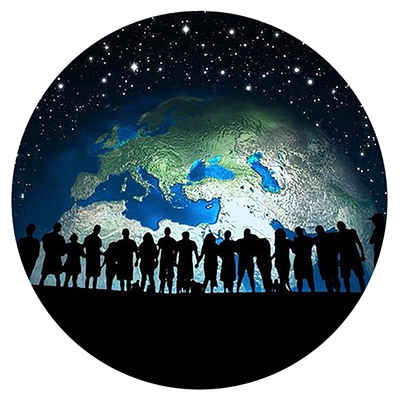Why am I living on Earth?

Biological and Evolutionary Reasons
Adaptation and Survival:
Humans live on Earth because our species, Homo sapiens, has evolved here over millions of years. Our physical and biological systems are adapted to the Earth’s environment, including its gravity, atmosphere, and the presence of water. Earth provides the necessary conditions for human life, example: suitable temperatures and the availability of oxygen and food sources.
Ecological Niches:
Throughout evolution, humans have developed to fit into various ecological niches on Earth. Our ancestors adapted to different environments, from savannas to forests, which has allowed our species to thrive across diverse climates and landscapes.
Environmental Reasons
Suitable Atmosphere:
Earth’s atmosphere is composed of a mix of gases, primarily nitrogen and oxygen, which is crucial for human survival. This specific composition protects us from harmful solar radiation and allows for breathing, a vital process for life.
Water Availability:
Earth is unique in our solar system for having abundant liquid water on its surface. Water is essential for all known forms of life, including humans. It is involved in various biological processes, example: digestion, circulation, and temperature regulation.
Temperate Climate:
The Earth’s climate, which varies from region to region, falls within a range that supports human life. While there are extreme environments, most of the planet has temperatures that humans can endure with or without minimal technological assistance.
Technological and Societal Reasons
Technological Development:
Humans have developed technology that allows us to live comfortably on Earth. From building shelters to creating complex societies, our technological advancements have enabled us to make use of Earth’s resources efficiently.
Societal Structures:
Over thousands of years, humans have built civilizations with social structures, laws, and cultures that make living on Earth organized and sustainable. These societal systems support large populations and ensure the provision of food, safety, and healthcare.
Historical Facts

Origin of Life:
Life on Earth began around 3.5 billion years ago. The earliest forms of life were simple microorganisms. Over billions of years, these simple forms of life evolved into more complex organisms, leading eventually to the appearance of humans.
Human Evolution:
Humans evolved from primate ancestors over the last few million years. Homo sapiens, the species to which all modern humans belong, emerged around 300,000 years ago in Africa. From there, humans spread across the globe, adapting to various environments.
Agricultural Revolution:
Around 10,000 years ago, humans began to practice agriculture, which allowed them to settle in one place and form complex societies. This revolution in food production led to population growth and the development of cities and civilizations.
Industrial Revolution:
In the 18th century, the Industrial Revolution transformed human societies. Advances in technology, manufacturing, and transportation dramatically changed how humans live and work, enabling greater exploitation of Earth’s resources and fostering global connections.
Space Exploration:
In the mid-20th century, humans began to explore space, landing on the Moon and sending probes to other planets. Despite these achievements, Earth remains the only place in the universe known to support human life.
Philosophical and Existential Reasons
Unique Planet:
Earth is the only known planet that supports life as we know it. Despite extensive searches for extraterrestrial life, no other planet has been found that has the right conditions to sustain human life.
Human Connection:
Humans have a profound connection to Earth. It is our home, the place where our species originated and evolved. Our cultures, histories, and identities are deeply tied to the planet.
Ethical Stewardship:
There is a growing recognition of the responsibility humans have to protect and preserve Earth. As the only known habitable planet, it is our duty to ensure that it remains a viable home for future generations.
Living on Earth is the result of a complex interplay of biological, environmental, technological, societal, historical, and philosophical factors. Our species has evolved to thrive here, and our continued existence depends on the unique conditions that Earth provides.

Understanding these reasons helps us appreciate the importance of preserving our planet and sustaining the life it supports.












